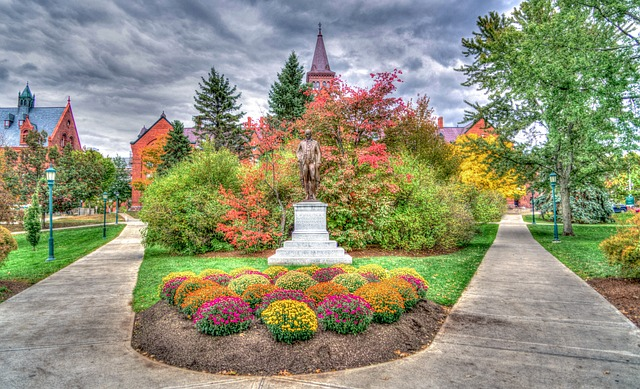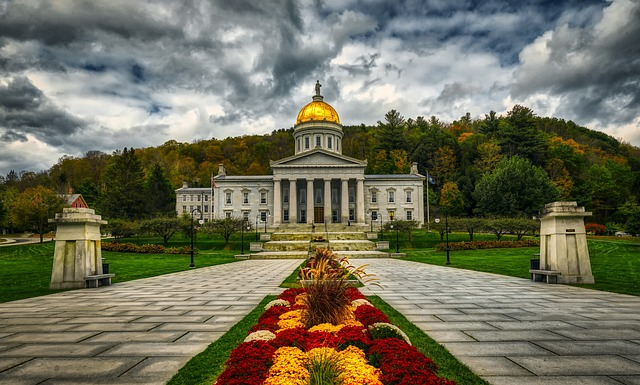
Vermont is truly a special state, offering a unique blend of natural beauty, higher academia, and a prime location on the thriving East Coast of the United States. The state’s natural landscapes, with its lush forests, pristine lakes, and breathtaking mountains, create a haven for outdoor enthusiasts and nature lovers–attracting both tourists and long-term residents. Vermont’s commitment to preserving its environment is evident in its pristine wilderness areas and initiatives promoting sustainability. Moreover, Vermont is home to renowned academic institutions like the University of Vermont and Middlebury College, fostering a culture of learning and innovation. It’s no wonder this area has long attracted real estate investors looking to deepen their portfolios!
The state’s location on the East Coast positions it as a gateway to both bustling metropolitan areas and serene countryside, allowing residents and visitors to enjoy the best of both worlds. With its picturesque scenery, educational opportunities, and access to the vibrant East Coast, Vermont stands out as a truly special state–especially when it comes to investment property opportunities. To understand how to find a lucrative Vermont investment property, however, it requires understanding the local markets in Vermont as well as an overview of your different real estate investment opportunity types to dial in just the right fit for your budget and needs.
New to passive real estate investing?
Explore Ark7 OpportunitiesVermont Real Estate Market Overview
The Vermont real estate market has long been characterized by its rustic charm and scenic beauty, making it an attractive location for both primary residences and vacation homes. Despite its relatively small population and limited urban areas, Vermont has a unique appeal for those seeking a quiet, nature-oriented lifestyle.
Key Highlights:
- Population Growth: Vermont’s population has been relatively stable over the years, with a modest increase in recent times, primarily driven by domestic migration from urban areas.
- Inventory Challenges: Like many other states, Vermont has experienced a shortage of available housing units. This scarcity has contributed to an increase in home prices and competition among buyers.
- Rural vs. Urban: The state’s housing market varies between rural and urban areas, with urban areas like Burlington and Montpelier experiencing higher demand and faster price appreciation than rural regions.
Vermont Housing Market Projections for 2024
Real estate market projections are subject to change based on a variety of factors, including economic conditions, interest rates, and demographic shifts. However, as of the latest data available, here are some key projections for the Vermont housing market in 2024:
- Continued Demand: The demand for Vermont properties is expected to remain strong, with a particular emphasis on homes with larger plots of land and proximity to natural amenities.
- Price Appreciation: While the rate of price appreciation is anticipated to slow down compared to recent years, Vermont’s real estate market is expected to see modest price increases in 2024.
- Interest Rates: Mortgage rates are a significant driver of housing market activity. Low and stable interest rates are expected to persist, supporting homebuyer affordability.
- Inventory Challenges: The shortage of housing inventory is expected to continue, especially in urban areas, resulting in competitive bidding and potentially driving up prices.
What Is the Median Home Value in Vermont? Median Sale Price?
As of the latest available data, the median home value and median sale price in Vermont have shown a steady increase, reflecting the state’s appeal to homebuyers seeking a unique lifestyle.
Median Home Value: The median home value in Vermont is approximately $389,000 as of latest available data from Zillow. This figure represents the middle point in the state’s housing market, indicating that half of the homes are valued below this amount, and half are valued above.
Median Sale Price: The median sale price, which may be slightly higher due to transaction costs and market dynamics, stands at approximately $310,000, according to VT Digger. This value is an essential indicator for understanding the cost of buying a typical home in Vermont.
Best Markets in Vermont Real Estate

Vermont’s diverse landscapes and scenic beauty have made it a prime destination for real estate investors and enthusiasts alike. Whether you’re seeking investment opportunities, long-term rentals, or the charm of waterfront living, Vermont offers a range of real estate markets to explore. Let’s look at the leading markets in Vermont.
Short Term Rentals
Vermont’s short-term rental market has experienced significant growth in recent years. The rise of platforms like Airbnb and Vrbo has provided property owners with opportunities to capitalize on the state’s tourism industry.
Key Highlights:
- Tourism Industry: Vermont’s tourism industry thrives throughout the year, drawing visitors with its picturesque landscapes, ski resorts, and outdoor activities. This has created a robust demand for short-term rental accommodations.
- Regulations: It’s essential for potential short-term rental investors to be aware of local regulations and zoning ordinances. Vermont municipalities have varying rules regarding short-term rentals, and compliance is crucial.
- Investment Potential: Owning a property in a popular tourist destination can be a lucrative venture. However, it’s vital to understand the seasonality of tourism in Vermont and the competition in the short-term rental market.
Long Term Rentals
Long-term rentals in Vermont are an attractive option for investors looking for a more stable income stream and a consistent return on their investment.
Key Highlights:
- Academic Institutions: Vermont is home to numerous academic institutions, including the University of Vermont, Middlebury College, and more. These institutions create a consistent demand for long-term rental properties for students, faculty, and staff.
- Steady Rental Market: While short-term rental markets can be seasonal, long-term rentals offer a more steady income stream. With the right property in the right location, investors can enjoy reliable rental income.
- Property Management: Long-term rentals often require less hands-on management than short-term rentals. Property management companies can assist in overseeing long-term rental properties.
Waterfront Property
Vermont’s pristine lakes, rivers, and ponds offer numerous opportunities for those seeking the tranquility of waterfront living. Waterfront properties are highly sought after and can serve both as primary residences and vacation homes.
Key Highlights:
- Scenic Beauty: Living on a waterfront property in Vermont provides an unparalleled lifestyle with access to outdoor activities like swimming, boating, and fishing. The calming sound of water and the picturesque views are major draws.
- Property Values: Waterfront properties typically have higher market values than inland properties. Their desirability and limited supply contribute to their strong appreciation potential.
- Considerations: Purchasing a waterfront property may come with unique considerations, such as flood zones and shoreline regulations. It’s crucial to research these aspects thoroughly before making a waterfront property investment.
The 10 Best Places to Buy Investment Property in Vermont

Vermont’s real estate market has garnered attention from investors seeking to capitalize on the state’s unique blend of natural beauty, recreational opportunities, and a robust tourism industry. Let’s explore the ten best places to buy investment property in Vermont, considering insights into the key factors that make these areas stand out.
Burlington, VT
Burlington, the largest city in Vermont, offers a diverse real estate market with a variety of investment opportunities. The presence of the University of Vermont and a bustling cultural scene make it an appealing location for long-term rentals, particularly to students and faculty.
Key Highlights:
- Economic Hub: Burlington is Vermont’s largest city and serves as the economic hub of the state. The presence of the University of Vermont and several tech companies has created a strong rental market.
- Tourism: The city’s vibrant arts and culture scene, as well as its proximity to Lake Champlain and ski resorts, ensure a consistent flow of tourists, making short-term rentals a lucrative investment option.
Stowe, VT
Stowe, a popular year-round tourist destination, is an excellent choice for short-term rental investments. With ski resorts, hiking trails, and scenic landscapes, the demand for vacation rentals in this area remains high.
Key Highlights:
- Tourism Hub: Stowe is renowned for its world-class skiing and outdoor recreation. It is a prime location for vacation rentals, attracting visitors year-round.
- Property Appreciation: The high demand for properties in Stowe has led to strong appreciation potential for real estate investors.
Jericho, VT
Jericho is a tranquil, family-friendly town that appeals to those seeking long-term rental properties. Its proximity to Burlington makes it attractive to commuters while providing a peaceful environment for residents.
Key Highlights:
- Proximity to Burlington: Jericho’s proximity to Burlington makes it an appealing option for both long-term and short-term rentals. Commuters often seek properties in Jericho.
- Rural Appeal: The town offers a rural charm, which can be attractive for those seeking a more peaceful lifestyle.
Colchester, VT
Colchester, located on Lake Champlain, combines waterfront living with suburban amenities. Waterfront properties here can be prime investments due to their scenic beauty and access to outdoor activities.
Key Highlights:
- Lakefront Living: Colchester boasts Lake Champlain frontage, making it a desirable location for waterfront properties.
- Strong Economy: The town’s growing economy and access to amenities make it a sound investment option.
Charlotte, VT
Charlotte is another Lake Champlain gem, offering an array of waterfront properties. It’s an attractive market for those looking to invest in idyllic, year-round or seasonal waterfront homes.
Key Highlights:
- Scenic Beauty: Charlotte’s natural beauty and views of Lake Champlain make it a sought-after location for investment in waterfront properties.
- Luxury Market: The town’s luxury real estate market has been on the rise, offering high-end investment opportunities.
Rutland City, VT
Rutland City, Vermont’s second-largest city, presents a mix of investment opportunities. The city’s varied neighborhoods and housing options make it a compelling location for both long-term and short-term rental properties.
Key Highlights:
- Affordability: Rutland City’s affordability and diverse housing market make it an attractive option for real estate investors.
- Economic Diversification: The city’s economy has diversified, creating potential opportunities for both short-term and long-term rentals.
Essex, VT
Essex, a growing town near Burlington, has a robust rental market, driven by its accessibility to major employment centers. Long-term rental properties can find a steady demand here.
Key Highlights:
- Convenience: Essex offers a convenient location with easy access to Burlington, making it an appealing choice for commuters.
- Steady Demand: The town has a steady demand for rental properties due to its amenities and schools.
Norwich, VT
Norwich, a charming town on the New Hampshire border, is home to Dartmouth College. Rental properties in Norwich have steady demand from college faculty, students, and staff.
Key Highlights:
- Academic Institutions: Home to Dartmouth College, Norwich offers rental opportunities for students and faculty, contributing to a steady demand for properties.
- Scenic Beauty: The town’s natural beauty and proximity to the Connecticut River make it an attractive location for investors.
Shrewsbury, VT
Shrewsbury, a rural town, offers an alternative investment experience. Those interested in rural, long-term rental properties may find opportunities in the serene and picturesque countryside.
Key Highlights:
- Rural Charm: Shrewsbury’s rural charm and natural surroundings create a unique appeal for those seeking investment in a quieter setting.
- Potential for Growth: As Vermont’s real estate market expands, Shrewsbury may see increased interest from investors.
Montpelier, VT

Montpelier, the state’s capital, provides a unique investment landscape. With a mix of government offices and vibrant cultural activities, it’s an attractive location for long-term rental investments.
Key Highlights:
- Capital City: Montpelier is the capital of Vermont, and its stable economy, government employment, and a strong sense of community make it an excellent choice for long-term rentals.
- Historic Appeal: The city’s historic charm and vibrant downtown are attractive for both tenants and investors.
Do I Need a Professional Real Estate Agent to Secure Vermont Investment Properties?
When it comes to investing in real estate, particularly in a picturesque state like Vermont, the question often arises: Do I need a professional real estate agent to secure investment properties? While real estate agents can provide valuable insights and assistance, the truth is that you don’t necessarily need one to make a smart investment. In fact, there are alternative strategies and platforms that can help you secure investment properties in Vermont with little to no down capital. One such approach is share-by-share investing.
The Role of Real Estate Agents
Real estate agents play a vital role in property transactions. They can offer market expertise, provide access to property listings, negotiate deals, and ensure that the process runs smoothly. For many homebuyers, especially those looking for a primary residence, the guidance of a real estate agent is invaluable. However, when it comes to investment properties, there are alternatives worth exploring.
Alternatives to Traditional Real Estate
- Educate Yourself: One of the first alternatives to relying on a real estate agent is to educate yourself about the Vermont real estate market. By conducting thorough research and staying informed about market trends, you can make informed decisions. Understanding the key factors that influence property values in the region, such as location, local amenities, and demand, is essential.
- Online Property Listings: In today’s digital age, online property listings have become a valuable resource. These platforms allow you to browse listings, filter by location and property type, and even set up alerts for new listings that meet your criteria.
- Networking: Building a network of contacts in the real estate industry, including investors, property managers, and contractors, can be immensely beneficial. These connections can provide valuable information and insights, potentially leading you to promising investment opportunities without the need for an agent.
- Share-by-Share Investing: Share-by-share investing, also known as real estate crowdfunding or real estate investment trusts (REITs), is a modern approach to real estate investing. This method allows individuals to invest in real estate with relatively small amounts of capital. Instead of purchasing an entire property, you can buy shares in a property or a portfolio of properties, often managed by a professional team.
Share-by-Share Investing
Share-by-share investing offers several advantages, particularly for those who want to get started in real estate with little to no down capital. Here’s why it’s a great option:
- Diversification: By investing in shares of multiple properties or a portfolio, you can diversify your real estate investment without the need for a substantial upfront investment. This can spread risk and potentially increase returns.
- Professional Management: REITs and real estate crowdfunding platforms are typically managed by experienced professionals who handle property acquisition, maintenance, and leasing. This allows you to benefit from their expertise without the hands-on responsibilities of property management.
- Accessibility: Share-by-share investing is accessible to a wide range of investors, including those who may not have the capital to purchase an entire property. You can start with a small investment and gradually expand your real estate portfolio over time.
- Liquidity: Unlike traditional real estate, which can be illiquid and challenging to sell quickly, share-by-share investments often provide liquidity. You can buy and sell shares on the secondary market, allowing for greater flexibility.
- Low Entry Barrier: As mentioned earlier, share-by-share investing requires minimal upfront capital. This makes it an ideal choice for those looking to get their foot in the door of the real estate market without a substantial financial commitment.
Find Your Next Investment Property in the Green Mountain State

While real estate agents can be helpful, they are not a strict necessity when it comes to securing investment properties in Vermont. Educating yourself, leveraging online resources, networking, and exploring share-by-share investing are all valid alternatives to traditional real estate transactions. Share-by-share investing, in particular, offers a low-entry barrier and professional management, making it an excellent way to start investing in Vermont’s real estate market, even with little to no down capital. With the right knowledge and strategy, you can embark on a successful real estate investment journey in the Green Mountain State.
Looking for more places to invest on the east coast? Check out these resources:
- Best Places to Invest in Massachusetts
- Best Places to Invest in Connecticut
- Best Places to Invest in New York
